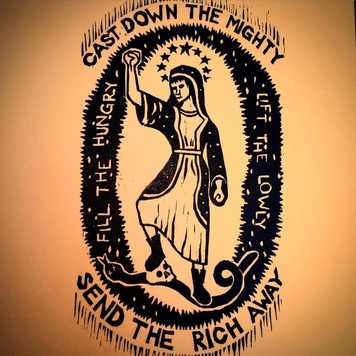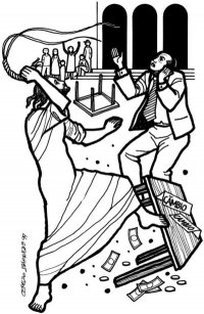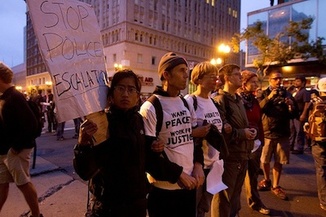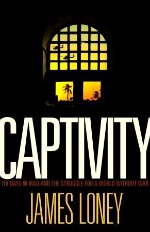|
12/23/2016 Comments Un-Domesticating AdventBy: Drew G.I. Hart Note: Originally posted at Drew's blog Taking Jesus Seriously on the Christian Century. "When Herod saw that he had been tricked by the wise men, he became enraged. He sent men to kill all the children in Bethlehem and throughout the surrounding region from the age of two and under, according to the time he had learned from the wise men. Then what was spoken by Jeremiah the prophet was fulfilled:  Linocut by Ben Wildflower Linocut by Ben Wildflower Christmas, for many, is about the warm and fuzzy feelings that come from buying and sharing gifts with loved ones and for some it is also a reminder of Jesus’ birth. The Christian calendar pushes us even further past the commercialism and the narrowness of that one day and turns the church’s attention towards cycling through a season of anticipating the coming of Jesus. We can be thankful for this redirection. However, since much of the Christian calendar as we know it developed alongside Christendom, Advent also frequently failed to communicate the good news of Jesus’ coming in the midst of the cycles of violence and oppression. If we are to understand the delivering force of Jesus’ coming and presence on the earth, we must un-domesticate the Jesus story. The cycles of violence and oppression in our world are certainly not new. Over and over again societies have chosen to organize their lives through systems that violate the dignity of the poor, crush the oppressed, and execute the dreamers that find the courage to live into the possibilities of another world. This is reenacted through the biblical story and through all of human history. For example, in our society today, Black Americans are scripted by the broader society’s narrative as suspicious and dangerous criminals that need constant surveillance. It is believed that vigilante policing is needed to remove and control their black bodies and the danger they present to other Americans. Furthermore, too many African American communities are a den of exploitation. As black people fled the south from white terrorism in the early 20th century, they were systematically forced into racially confined borders now called ghettos. The resources, opportunities, and institutions, as well as economic wealth, were removed or significantly stifled in these neighborhoods while those that were able to labor frequently did so only to bring more wealth to those outside of their communities. This colonial-like exploitation is combined with ongoing violence, discrimination, and demonization. Mob violence and lynching, police brutality, and entire systems, like the convict leasing system of the early 20th century or the modern day prison industrial complex, disproportionately targeted black communities. Today the choice to take the path of destruction and death rather than the way of life can be seen when we do not fund education but instead funnel that money towards prisons, when we spend more money on a global military complex rather than for the flourishing of those who are hungry and impoverished. In the United States, many are calling for the mass deportation of thousands of vulnerable refugees, our society is targeting Muslims through dehumanizing and hateful threats, and many people refuse to see the imago Dei in LGBTQ persons. Women (disproportionately WOC) still continue to experience sexual assaults on our college campuses as well as in their neighborhoods and homes. And our society recently watched as the ongoing forces of violence brutally unfolded once again against indigenous Americans and their relation to their ancestral lands. In this country, the vicious cycles of violence and oppression are intertwined with the multidimensional overlaps of white supremacy, patriarchy, and plutocracy. Far from abstract ideas and theories, these forces have been devastating real people and the bodies they inhabit. Jesus came into a society that also had been going through its own ongoing cycles of violence and oppression. Not only was he born under Roman occupation, but more directly under Herod the Great, who according to the book of Matthew was an egotistical and self-conscious leader that couldn’t help but attempt to squelch anyone and everyone that competed with his reign (sound familiar?). According to Matthew's account, Herod got fooled by the wise men because he wanted them to report back to him about the status of the Messiah but instead they took another route back home to avoid him. Getting outsmarted and bamboozled made him very angry. Herod unleashed a violent top-down decree that targeted the young boys in and around the Bethlehem region. This unjust “Law and Order” attempt to shut down the possibility that another world could arise, one that could exist without him as its leader, became a death-dealing attack on vulnerable children. Infant boys up to toddlers the age of 2 were being dragged out of their homes and executed. This regional genocide of the boys, within this gospel narrative, was all part of an attempt to uphold and renew Herod’s imagined supremacy in the land. Parents, siblings, and neighbors watched as an inhumane policy manifested into young lifeless Jewish boys’ bodies laying on the ground as though their lives were not precious. In response, mothers lamented and wailed: “A voice was heard in Ramah, The cries of those that suffer were heard by God. While Herod probably closed his ears to the pain of those that had loved ones abruptly taken, God had heard their weeping and would not abandon them. The God of the Bible is not a Herod or Caesar-like figure but just with super-sized power. God’s character is holy and unlike such fragile rulers. God does not puppet humanity nor does our Creator orchestrate every human event (though God certainly is present in those moments actively overcoming our evil with divine good). God has not preordained evil nor does he find pleasure in human violence. Rather than imposing Godself onto others, God is present in the world actively but non-coercively shepherding creation towards liberation and shalom. Jesus’ coming, as such, is no different. Jesus’ coming as the messiah of God should be understood in response to the troubles of this world. The enduring night of violence and oppression are not inconsequential to Jesus’ presence among us. Jesus was born into the chaos of violence and oppression, but the Way of Jesus invites disciples to enter, in contrast, into a gracious and life-giving path of deliverance out of these devastating cycles. Yes, he came to deliver us from our sin; our personal sin, our collective sin, our societal and systemic sin, and our generational sin, etc. By God’s grace, there is a better Way than remaining complacent in the status quo world as it is. We should not be comfortable with this arrangement and we certainly should not be conforming to its patterns. Through the delivering Way of Jesus, enemies are converted into friends, the oppressed are liberated, the last are made first, the outcasts are gathered around the Messianic banquet table, and in Jesus we find our hope. When we take a closer look at vs. 18 in the second chapter of Matthew, we are told that Rachel is weeping for her children and refuses to be comforted. At a quick glance this might feel like a passage of despair, but a careful reading reveals the true hope Jesus provides for us. This passage is quoting from Jeremiah 31:15. In the original biblical context, this verse of lament is actually situated in a passage steeped with a dramatic proclamation of hope that God is about to do a new thing which will restore God’s people from exile and distress. In the broader passage that sandwiches this one verse, God commits to a coming time when the children of God will be rescued from oppression, returned to their land, and rebuilt as a people. All of this flows out of their humbly walking with God through faithful repentance (31:16). This is hope in God's shalom; the restoration of God's people living into their calling with one another, with their Creator, and with the land. Whether you celebrate Christmas or Advent, what matters is that we grasp the liberating power that the Way of Jesus has opened up for us. It is a non-coercive gift, but when we accept the call to become a disciple of Jesus, following his teachings and life, we abide with God and we participate in a divine disruption of the cycles that kill and destroy life and flourishing. 1 John 2:6 reminds us that abiding in God requires also that we live as Jesus lived. That should be a reminder that warm and fuzzy feelings through Christmas carols or advent liturgy are fine, but if it doesn't break the cycles of violence and oppression devastating our lives while we follow Jesus tangibly every day in community with others, then we probably are not centered in God as much as we might like to think. The United States has some difficult days ahead, so the presence of Jesus made real in our lives, which is able to deliver us from which entangles us, is needed if we are going to struggle for peace and justice in a faithfully credible way. There are many people weeping and lamenting these days, unable to be comforted because of the suffering they have already experienced, and for others they weep because of the fear of the possibility of hardships to come. May there be a people of God that can, by God’s grace, walk as Jesus walked while drying their tears and helping them encounter the Messiah’s reign breaking into their world this season.  Drew G. I. Hart is an author and professor in theology and ethics. His blog Taking Jesus Seriously is hosted by the Christian Century.
Comments
7/4/2016 Comments The Violence of NormalBy: Regina Shands Stoltzfus  Note: this article was originally published on Sojourners. As a professor of peace, justice, and conflict studies at a small liberal arts college in the Midwest, I spend a lot of time talking about violence. Early in the semester, I have my students complete a group exercise: They are given 21 sheets of paper, each sheet with an action on it, and instructions to create a continuum of these actions that span from least violent to most. These actions include kicking, starting rumors, leering, shooting someone, stabbing someone, writing graffiti, name-calling. Typically, the exercise begins easily enough—shooting and stabbing quickly make their way to the “most violent” end of the continuum. But from there, the more diverse the identities and life experiences of the students, the more difficult the exercise becomes. With that, a conversation emerges that carries over into the rest of the semester, as students each identify an aspect of violence that they will research. The question that undergirds their research, and the course itself, is, “What is the societal permission for this kind of violence?” As a nation, we expressed horror at the vile act of violence in Orlando, Fla., nearly coinciding with the one-year anniversary of more violence in Charleston, S.C. We mourn and debate stricter gun laws. Yet we ignore steps on the continuum to violence that has made such shootings almost routine. 12/20/2011 Comments A Bloodless ZealBy: James Hamrick  Whenever I talk to Christians about the non-violent way of Jesus they inevitably bring up an incident from Jesus’ life that ‘proves’ that pacifism is nonsense: his cleansing of the temple. All four canonical Gospels tell us that Jesus went to Jerusalem, entered the temple, and proceeded to chase people and animals out, overthrow tables, and cause an overall ruckus. The Gospel of John even tells us he used a whip. “That certainly doesn’t sound like something a pacifist would do!” Unfortunately, this story is not the slam-dunk that violent Christians think it is. Ultimately there is no contradiction between Christian pacifism and Jesus’ action in the temple. 10/28/2011 Comments Confessing Pacifism, Repenting in LoveBy: Nichola Torbett  A few weeks ago, I wrote a piece for this website that called for a confessing movement. Consider this my first confession, inspired largely by my participation in Occupy Oakland. Until recently, I have been what one of friends calls a “nonviolence fundamentalist.” Inspired by the movements of Mahatma Gandhi and Martin Luther King, Jr., among others, I have had a deep intuitive sense that our means of social change must be consonant with the ends we wish to achieve. If it is not just a reversal of oppressions that we seek to achieve but a real reign of love, then we must get there without straying from love. I believe this is also the message of the gospel, in which Jesus of Nazareth maintained his commitment to love, manifest in nonviolence, all the way to the cross and beyond, initiating a Reign of Love that is somehow both “at hand” now and yet not fully here, and by the tenants of which I am, as a disciple of Jesus, called to live now, no matter the cost. In an attempt to live out that discipleship, I have chosen to engage in justice struggles only when those struggles have been predicated on a strong commitment to nonviolence; as a result, there have been many movements with which I have not engaged and which I have sometimes even critiqued. These include many led by low-income communities of color. As woman with white-skin privilege and middle-class connections, I must repent of that now. 8/22/2011 Comments Book Review: CaptivityBy: Christopher Knestrick  Captivity: 118 days in Iraq and the Struggle for a World without War by James Loney, a member of the Christian Peacemaker Teams (CPT) and a Catholic Worker is a great book for anyone seeking to create peace and justice in this world. The book is the story of when James Loney and three other Christian Peacemaker Teams members, Tom Fox, Harmeet Singh Soode, and Norman Kember, were kidnapped in Iraq while participating in a delegation and held for 118 days. It is a book about humanity in all its paradoxes—a humanity that searches for freedom and forgiveness in the midst of war. The Christian Peacemaker Teams started in 1986 with a question, “What would happen if Christians devoted the same discipline and self sacrifice to nonviolent peacemaking that armies devoted to war?” Struggling to live out this question, CPT began to ally with local nonviolent peacemakers around the world who are risking their lives to bring peace and justice to their communities. Today, CPT has teams in Colombia, Iraq, Palestine, and Canada. |
Disclaimer
The viewpoints expressed in each reader-submitted article are the authors own, and not an “official Jesus Radicals” position. For more on our editorial policies, visit our submissions page. If you want to contact an author or you have questions, suggestions, or concerns, please contact us. CategoriesAll Accountability Advent Anarchism Animal Liberation Anthropocentrism Appropriation Biblical Exegesis Book Reviews Bread Capitalism Catholic Worker Christmas Civilization Community Complicity Confessing Cultural Hegemony Decolonization Direct Action Easter Economics Feminism Heteropatriarchy Immigration Imperialism Intersectionality Jesus Justice Lent Liberation Theology Love Mutual Liberation Nation-state Nonviolence Occupy Othering Pacifisim Peace Pedagogies Of Liberation Police Privilege Property Queer Racism Resistance Resurrection Sexuality Solidarity Speciesism Spiritual Practices Technology Temptation Veganism Violence War What We're Reading On . . . White Supremacy Zionism ContributorsNekeisha Alayna Alexis
Amaryah Armstrong Autumn Brown HH Brownsmith Jarrod Cochran Chelsea Collonge Keith Hebden Ric Hudgens Liza Minno Bloom Jocelyn Perry Eda Ruhiye Uca Joanna Shenk Nichola Torbett Mark VanSteenwyk Gregory Williams Archives
October 2017
|
Search by typing & pressing enter

 RSS Feed
RSS Feed